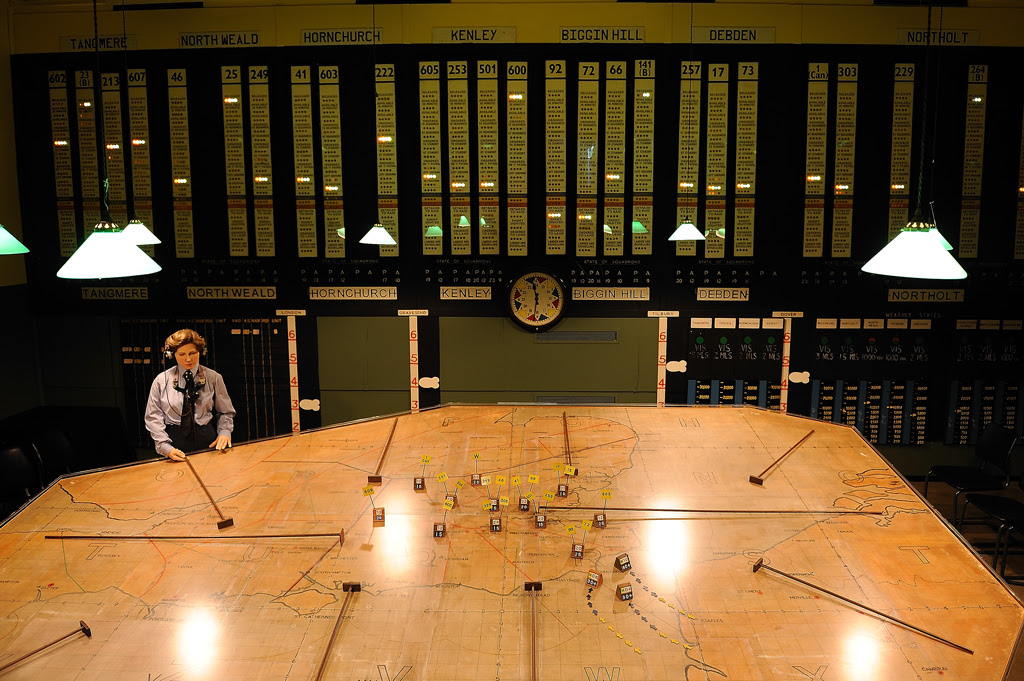A repost from the 75th Anniversary.
"What other reserves have we?"
That was Churchill's question to Air Vice Marshal Keith Park on the penultimate day of the Battle of Britain.
On 15 September 1940 the Germans attempted to draw the Royal Air Force
into a battle of annihilation with their largest and most concentrated
daylight attack against London. They sent 620 fighters and 500 bombers
against the R.A.F's 660 fighters.
September 15, 1940 was also the day that Churchill had decided on to
visit the headquarters of Sir Keith Park, commander of Fighter Command's
11 Group which protected southeast England i.e. where the German's were
headed.
At 2:35, Churchill, who had been watching the plotting table where the
waves of bombers coming in since 10:10 were depicted, noticed that all
the red light bulbs that denoted RAF fighter squadrons in action were
lit and asked the famous question, "What other reserves have we?"
Park's reply:
"There are none."
From the Battle of Britain blog:
Day 68 – 15th September 1940
Battle of Britain Day
Weather: fine
Fighter Command Serviceable Aircraft as at 0900 hours:
Blenheim – 47
Spitfire – 192
Hurricane – 389
Defiant – 24
Gladiator – 8
Total – 660
Weather wise this was finally the opportunity the Luftwaffe had been waiting for. Accordingly, in mid-morning the radar along the south coast picked up evidence of mass raids which duly appeared over southern England heading for London. All three groups, 10, 11 and 12 in southern England now played their part in intercepting the incoming armada. There were no less than 30 squadrons who were engaged in intercepting and contesting the progress of this vast fleet of German bombers. Furthermore, the latter was accompanied by a very strong force of Me109s. Naturally, despite the aerial battles which developed, substantial damage was done to London. This was partly due to the manner in which the German bombers jettisoned their bombs when under attack.
Bombs fell again on Buckingham Palace. One sergeant pilot who shot down a Do17, from which the German crew managed to parachute to safety, was himself shot down and managed to bale out ending up in a dustbin in Chelsea. Proceedings that day demonstrated beyond doubt that Fighter Command, far from being on the verge of collapse, was on vigorous form. Despite the RAF claiming that it had shot down no less than 183 aircraft, when the actual figure was 56, for a loss of 26 aircraft, the result was almost three to one in the RAF’s favour. For the Germans it was the sheer experience of having to fight their way to London and back when they had been assured that the opposition was almost at an end, that so riled them....MORE
Two days later Hitler quietly shelved the plans for the invasion.
Although Park was quite shabbily treated by the R.A.F. establishment
immediately after the victory, post-war assessments pretty much all
agree:
"If any one man won the Battle of Britain, he did. I do not believe it is realised how much that one man, with his leadership, his calm judgement and his skill, did to save, not only this country, but the world."
That 'saving the world' bit rather stands out doesn't it?
Park went on to serve honorably on the Auckland (NZ) city council.
Kinda makes the investment stuff seem lightweight.
Here's Churchill's remembrance of that day in his book Their Finest Hour.
Previously:
75 Years Ago Today The Battle of Britain Began
Most of the introduction is from our 2013 post "Today in the Financial Crisis, Monday September 15, 2008: A Run on the Entire Financial System" which itself linked back to 2007's "Screw Northern Rock, It's Battle of Britain Day".
The plotting table at Uxbridge with the situation boards light bulbs on the facing wall:
